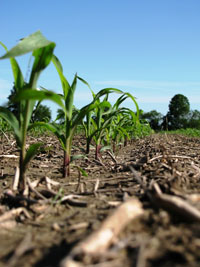There is plenty of corn in the latest reports out from USDA this week, which is good news for the ethanol industry.
 In the first official estimate of the 2010/11 crop, USDA is projecting corn production to beat last year by 260 million bushels and total 13.4 billion. “Based on the rapid pace of 2010 planting as reported in Crop Progress, the 2010/11 yield is projected at 163.5 bushels per acre, 2.7 bushels above the 1990-09 trend. Corn supplies are projected at a record 15.1 billion bushels, 325 million higher than in 2009/10.”
In the first official estimate of the 2010/11 crop, USDA is projecting corn production to beat last year by 260 million bushels and total 13.4 billion. “Based on the rapid pace of 2010 planting as reported in Crop Progress, the 2010/11 yield is projected at 163.5 bushels per acre, 2.7 bushels above the 1990-09 trend. Corn supplies are projected at a record 15.1 billion bushels, 325 million higher than in 2009/10.”
That’s a lot of corn – but it could be even more than that. Corn planting was more than 80 percent complete as of Sunday and almost 40 percent has already emerged, which is almost twice the normal pace. As the Renewable Fuels Association points out, “Should farmers see a near-normal growing season – something that has eluded them in recent years – USDA’s first yield estimate likely will prove to be on the low side. Consider that last year, despite an extremely late planting season and the worst harvest conditions in recent memory, farmers tallied a record average corn yield of 164.7 bushels/acre.”
Total U.S. corn use for the coming year is expected to be two percent higher than the current year, with exports projected to be up three percent and corn use for ethanol expected to toal 4.6 billion bushels, up 200 million from last year. That means that the 260 million bushel increase in corn production forecast for this year will more than offset the 200 million bushel increase in use for ethanol expected.
Growth Energy CEO Tom Buis says the estimates prove U.S. farmers can produce enough corn for food, feed and fuel. “As demand for clean, renewable ethanol continues to grow, these crop estimates prove that our farmers will be able to meet all the demand for food, fuel and feed in this country, as well as meet all our export obligations,” said Buis. “Food vs. fuel was a myth, propagated by deep-pocketed industries more interested in making profits than making our country more energy independent.”
Photo credit: Kelly Robertson Farms

